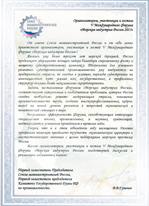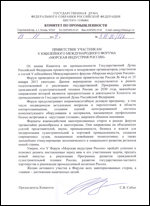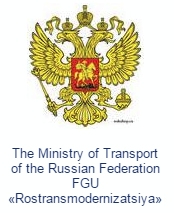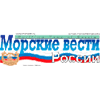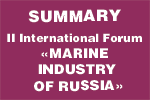“Marine Industry of Russia”
Exhibition Hall,
19-21 May 2015
The Forum has opened!
May 07, 2015
Greetings from the Ministry of Industry and Trade of the Russian Federation
January 28, 2015
The Forum organizers received the greeting from Gutenev V.V., the First Deputy Chairman of the Russian Engineering Union.
January 15, 2015
The Government of the Russian Federation addressed a welcome letter to the V International Forum Marine Industry of Russia.
THE QUANTUM LEAP OF THE RUSIAN ECONOMY IS INEVITABLE – an interview with the First Deputy Chairman of Committee on Industry of the State Duma, First Vice President of the Russian Engineering Union, V.V. Gutenev
March 19, 2015
The V International Forum Marine Industry of Russia will take place in Moscow in May 2015. First Deputy of the Committee on Industry of the State Duma, First Vice President of the Russian Engineering Union, V.V. Gutenev within his professional and public activity is related to many topics which will be discussed at the Forum. In this connection, we asked him a range of questions.
- Vladimir Vladimirovich, according to the experts and professionals in many sectors Russia can reach the level of certain independence from western business partners within 2 – 3 years. From your point of view, what priorities shall be set in this context?
 - Indeed, in some areas, especially where certain buffer stock exists, the level of import dependence can be overcome within 2-3 years. In other areas, where they are not available, probably more time will be required. However, one way or another, the task of the import substitution in industry, and in the Military-Industrial Complex – import independence, will surely be solved within a short time.
- Indeed, in some areas, especially where certain buffer stock exists, the level of import dependence can be overcome within 2-3 years. In other areas, where they are not available, probably more time will be required. However, one way or another, the task of the import substitution in industry, and in the Military-Industrial Complex – import independence, will surely be solved within a short time.
The question is that under the influence of the time factor we shouldn’t be tempted to perform import substitution using obsolete technologies.
I am confident that favourable prospects of our industry can be related only to the implementation of the export-oriented import substitution model, i.e. export increase simultaneous with the import substitution process.
This is the only way we can receive domestic products which are competitive not only on domestic market but also globally. As you understand, this can be achieved only by implementing innovative technologies.
This is why I, wherever I can, constantly highlight the ultimate necessity of full accomplishment of the technical upgrade programs for industrial companies.
In terms of priorities, the country, first of all, shall direct its support to the critically important technologies – electronic components, machine tool building, equipment for oil and gas industry, petrochemistry, etc.
Among the economic sectors the priority shall belong to those which are the foundation of the social and economic system of the country. First of all, this concerns the Military-Industrial Complex and high-tech industry sectors which development guarantees technological independence and technological safety.
- The current situation is the moment of truth not only for science and production, but also for various public and professional organizations. It’s not a secret that some of them eventually become formalized inactive structures. In this context, what is the situation in your organizations – The Russian Engineering Union and the League to Support Defence Industry Enterprises?
- I couldn’t agree more. Indeed, the activity of some public and professional organizations, unfortunately, has a lot of empty formalism and very little practical use.
This, luckily, does not relate to the Russian Engineering Union and the League to Support Defence Industry Enterprises Association which work in close cooperation.
I am saying this not only because I have the honour to be the member of these organizations. The thing is that in terms of the representative content, structure, and methodology both the Union and the League are totally focused on practical activities. One can say that a harmonic combination of the potential of authoritative, knowledgeable and initiative people in the governing bodies of our organizations with potential of representatives from production, science and education in regional branches which exist almost in all subjects of the federation has developed. And this combination though the mechanisms of Committees and Commissions of the Union and the League generates our initiatives, proposals, and practical events.
And this is exactly what people expect from us in the regions, in real production environment. They require not simple declarations but specific effective output. At this, I should say, is highly stimulating. The output is reflected in implementation of our initiatives in the main directions of industrial development in legislation, and decisions of the country leaders and industry-specific agencies.
Among them are the laws on the federal contractual system, on industrial policy, on industrial safety, and on education which include many provisions put forward by us. Or initiatives aimed at strengthening the talent pool of the Military-Industrial Complex, on renewal soft auto lending, etc.
In a nutshell, the entire potential of the Union and the League is constantly used to look for opportunities to provide favourable conditions for the industry, where no room for empty formalism is left.
In the context of the forthcoming Forum, I would like to mention that the Expert Council on Shipbuilding is being really established within the Duma Committee on Industry. And the Committee on Shipbuilding Industry and Marine Facilities is being formed at the Russian Engineering Union, headed by the Manager of the United Shipbuilding Corporation, Aleksey Lvovich Rakhmanov. The first Committee meeting is scheduled for April.
- You are the First Vice President of the Russian Engineering Union. In your opinion, what is the current condition of the engineering industry? Which efforts for solving the task of import substitution are made by the companies?
- Today, the industry on the whole and engineering in particular are in a very complicated situation. The recent figures from the Federal State Statistics Service show that the manufacturing index in 2014 was 102.1% as compared with a year earlier. In January 2015, it decreased to 99.9%, and in the production of vehicles and equipment it constituted 90.7% of January 2014 and only 38.6% in relation to December 2014.
The January figures, most probably, can not be considered indicative due to the calendar factor, but we have to acknowledge the complexity of the situation in engineering caused by the known external and internal reasons.
Having said that, it is clear that import substitution is gaining steam and this will inevitably give a substantial momentum to industrial growth. Today, we can give numerous examples of successful import substitution. Here is the one example from the shipbuilding sector. In 2015, Vyborg Shipyard JSC will perform commissioning of two line diesel-electric icebreaker ships with more than 18 MW power (so far, the largest vehicles of this class) manufactured with maximum possible volume of domestic components. For the following projects, Vyborg Shipyard is planning to gradually increase the degree of localization involving domestic suppliers.
Another example is the United Engine Corporation which has already launched production of VK-2500 engine which was previously manufactured by Ukrainian company Motor-Sich. This engine is installed on the most advanced models of helicopters and aircraft, including Mi-35M and Ka-52 helicopters.
So the import substitution process is becoming even more widespread, thus giving grounds for optimistic outlook for the entire national engineering.
- Is quantum leap of the Russian economy possible in the nearest three years at certain shortage of technologies and equipment? Which emergency measures are required so that Russian developers and manufacturers could deliver the maximum output?
- I am confident that it is not only possible but also inevitable. However, this requires every possible support to the industry from the state and society. A lot is being done, but it is not sufficient yet.
What industrial business requires in conditions of external sanctions is an easier access to internal financial markets.
Because the the situation is as follows. Today, the companies in many cases have already made a 50 percent advance payment to foreign suppliers of process equipment. However, the current financial resources of the companies at the current exchange rate may not be sufficient for full performance of contracts which can result in disruption of scheduled completion of technical upgrade. Moreover, the current key interest rate of the Central Bank is too high for the companies. This problem shall be addressed at last.
In this connection, the Russian Engineering Union together with the League to Support Defence Industry Enterprises put forward a range of initiatives to support the Military-Industrial Complex in the field of monetary policy. These initiatives have been reported to the nation’s leadership. Most of them are included to the government bailout plan.
We have prepared a number of proposals concerning development of import substitution for the forthcoming session of the State Council of the Russian Federation. While preparing them we consulted our regional branches.
Among them is a proposal to set the minimum permissible level of the Russian process equipment capability for various industries. In the future, this index shall be consistently increased up to 70-100%. At that, tax preferences shall be envisaged for the companies depending on the proportion of domestic equipment used.
We believe that it is necessary to ensure the lagging of the tariff increase of natural monopolies behind inflation rate, within 1% for energy sources and up to 3% for transport.
In financial and credit sphere we propose to ensure compensation of the credit interest rate so that its effective level does not exceed 12-13% for circulating assets and 10-11% for investment loan. We also propose to set the interest rate for loans in foreign currency at 5% maximum with the loan term up to 5 years in order to finance the completion of the technical upgrade programs and envision subsidizing of interest rates and compensation of exchange rate gaps.
We believe that the companies implementing investment projects on import substitution with bank loans shall be entitled to capitalization of due bank interests before the beginning of the project payback.
We also propose to relieve the Military-Industrial Complex enterprises included in the closed list of the Ministry of Industry and Trade of the Russian Federation of obligation to obtain the bank guarantee for participation in the state defence order. This measure will lower the expenses of the companies for funding, fulfilment of state defence order, and import substitution.
From our point of view, changes shall be made to the existing taxation system for implementation of import substitution programs which will ensure the possibility of accelerated depreciation for new large enterprises as well as enterprises which use equipment manufactured in Russia.
A one-year moratorium with possible extension shall be introduced on the new procedure for the calculation of Military-Industrial Complex land tax.
And finally, we believe that the companies shall create production development funds to accumulate money for equipment upgrade and renovation including depreciation allowances accounted for during determination of the income tax base where the money is purposefully spent only for technical upgrade of the companies.
- It is known that the demand for personnel in in the shipbuilding industry, engineering, and Military-industrial Complex is tremendous. Have you developed a draft law which is meant to solve the staffing problem in the Military-Industrial Complex, and what is the situation related to it?
- Indeed, we have developed such draft law. It is the product of collective opinion of the companies and universities which are members of the Russian Engineering Union and the League. It grants the military service deferment up to 4 years for university graduates who at the moment of conscription are employed at an organization of the Military-Industrial Complex, rocket and space or nuclear industry.
The legislative initiative is aimed at enhancing the talent pool of the Military-Industrial Complex through attraction of the most talented graduates of technical universities for the purposes of ensuring that the state defence order is effectively fulfilled, thus strengthening national security. This will help to overcome the problem of the time gap between the graduation and beginning of professional career, and to give the young specialists an opportunity to establish themselves in the industry and more effectively apply the gained knowledge in practical work. The document has been extensively reviewed by industrial and university community and won widespread support. Our initiative was approved by the Ministry of Industry and Trade of the Russian Federation having reported about it recently at a meeting with the Prime Minister.
I would like to point out that the draft law was sent to the Ministry of Defence of the Russian Federation and the Ministry of Education and Science of the Russian Federation which returned two completely opposite conclusions.
The Ministry of Education and Science supported the draft law and highlighted that its passage will help to tackle the problem of skill shortage at the companies of the Defence-Industry Complex.
At the same time the Ministry of Defence didn’t support the draft law referring mainly to the shortage of conscription resources.
What can be said in connection with this? I believe that having supported the draft law, the Ministry of Education and Science demonstrated the state approach to the problem of provision of high-tech industrial sectors with young specialists.
The attitude of the defence agency to this initiative looks rather strange. We are talking about the number of conscripts which does not exceed 14 thousand people which cannot affect the scheduled conscription into the Armed forces. We can understand the upholding of the agency interests, since the people in question are the most valuable asset – well educated, active young people who, of course, are extremely interesting for the Armed forces. One should, however, not forget how acute and urgent the staffing problem in the Military-Industrial Complex is, where the performance of the defence agency tasks depends on how effectively the problem will be solved.
In this situation we hope that the Government of the Russian Federation, as an integrator of agency opinions, will deliver its opinion in which it will support this draft law since the safety of the county and preservation of its technological and human potential are at stake.
- You pay a lot of attention to the topic of ecology and improvement of legislation in the field of industrial safety. There is some concern that in the process of solving pressing tasks related to the development of industry, the environmental situation will be compromised even more. From your point of view, is a complex approach to solving these issues possible? What, apart from the laws, is required for this and how likely is it in the conditions of the deficit-ridden budget?
- Today, the Russian business is in a very difficult situation due to well-known reasons. And in this connection there might be a temptation to make the environmental requirements less stringent for the sake of development. But remembering the the high price of consequences of such indulgence not only for the nature but for the human life too, this can’t be done.
Therefore, to achieve balance between strict requirements to the environmental standards and safety of industrial facilities on the part of the state and society and understandable desire of business to reduce costs for their performance, a complex approach is required.
What shall it involve? Each businessman aims at reducing operating costs through improvement of energy efficiency, reduction in consumption of materials, and better performance. This is achieved through adoption of innovative technologies. These technologies, as a rule, are becoming even more sustainable. So based on the combination of these two aspects the state shall promote business interest to investing both in innovations and ecology.
It is known that the Ministry of Industry and Trade put forward an initiative to adopt new environmental standards in industry. The state will support manufacturers who will be adopting the best available technologies at their plants at a rapid pace. Those who will not hurry with upgrading their production capacities to “green” standards will face increasing attention of authorities which control compliance with environmental standards in industry. The first stage of compulsory adoption of such technologies will begin in 2018 and will be completed by the end of 2022. Implementation of the program will undoubtedly help to improve the environment especially in industrially developed regions and single-industry cities, which meets the interests of our citizens.
However, when adopting new “green” standards we shall not allow it to turn into an intolerable burden for the manufacturing industry with its cost effectiveness in the region of 6% in the best case.
Therefore, industrial enterprises shall be powerfully encouraged to adopt the best available technologies thought the government support in the form offsetting the expenses related to upgrading towards payment for environmental impact, use of tax preferences, incentives on interest rates, etc. At that, the emphasis shall be placed on the principle that technologies themselves should be not only more sustainable, but also more efficient and hence competitive.
- Your wishes to the organizers of the V International Forum Marine Industry of Russia. Which Forum results can become a dignified contribution to solving challenging issues confronting the shipbuilding industry?
- I can wish the Forum participants only one thing – productive and successful work in searching in today’s complicated situation effective approaches to upgrading the industry, implementation of import substitution programs and establishment of national competitive shipbuilding industry. I believe that this will be the major contribution of the Forum to solving the challenging issues of shipbuilding.
Read also:
- March 16, 2015 - Technological Platform as a Driver for Economic Development - an interview with Valeriy Vladimirovich Kobylyanskiy, Coordinator of the Ocean Development TP, Deputy General Director on Innovative Development at Morinformsistema-Agat OJSC.
- February 27, 2015 - Murmansk – the territory of Arctic technologies Interview with the Deputy Governor of Murmansk region, G.I. Stratiya for the Marine Industry of Russia Forum portal
- January 28, 2015 - The Forum organizers received the greeting from Gutenev V.V., the First Deputy Chairman of the Russian Engineering Union.
- January 15, 2015 - The Government of the Russian Federation addressed a welcome letter to the V International Forum Marine Industry of Russia.
- November 27, 2014 - The International Forum Marine Industry of Russia received the greeting from the Chairman of Committee on Industry of the State Duma of the Russian Federation, Sobko S.V.
© Marine Industry of Russia, 2009-2010. All rights reserved.
By: “Ideological buiseness-projects”
Design by Valentina Ivanova.
